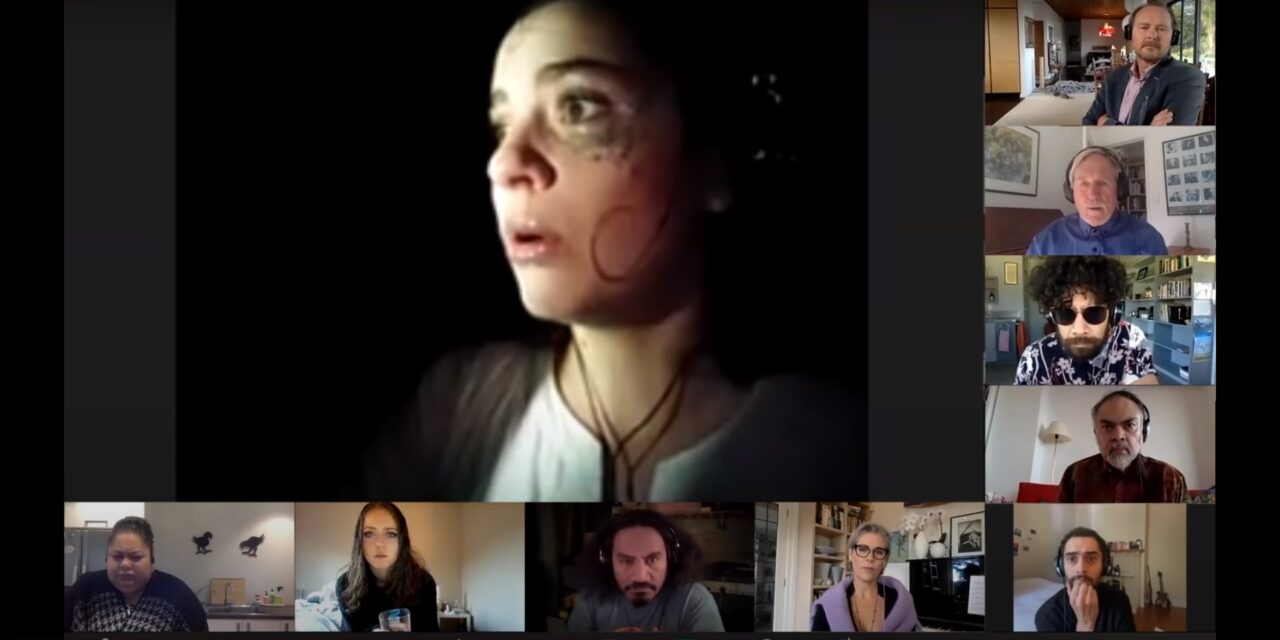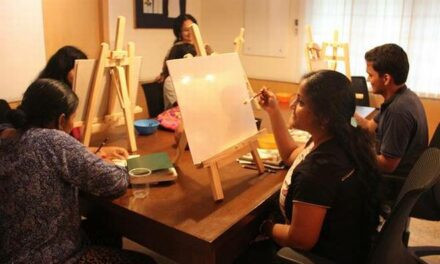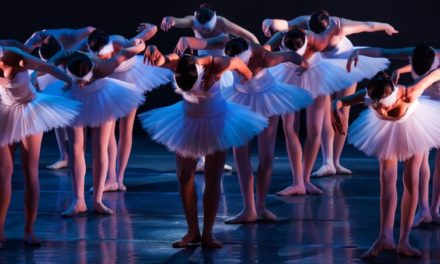As I write this, New Zealand has moved to Covid-19 Alert Level One, limited only by quarantine rules for international arrivals and a request for us all to support contact tracing. In late March, “Go early, go hard” was the government’s mantra. Performing arts rehearsals and live performances in public venues were cancelled as we moved into our Lockdown (Alert Level 4) ‘bubbles’, confined to home except for socially distanced food shopping and local exercise. Zoom became the tool-de-jour for work meetings and social interaction with family and friends – and its potential for creating Lockdown Theatre was immediately explored, using either Facebook Live or YouTube as platforms for the recorded shows.
Amateur theatres organised online play readings to keep their members active. Professional theatres worked with swiftly responding funding bodies to secure continuity or emergency relief grants and some proceeded to invent new ways to deliver shows to their audiences. And ever-creative independent co-ops variously rose to the challenge. Most notable were Centrepoint Theatre’s 24-Hour Challenge, the Auckland Theatre Company’s online adaptation of Anton Chekhov’s The Seagull and Circa Theatre’s It’s Behind You! (see below). But first, here’s an overview of what else happened over the 10 weeks of Lockdown Levels 4, 3 and 2.
(Most links to reviews include links to the online production where they are still available at the time of writing).
My colleague David O’Donnell marked the transition from live to livestream theatre with his Theatre Times review of George Fowler’s Princess Boy Wonder, at Wellington’s intimate BATS Theatre (a three-space venue which hosts independent co-ops on a profit-share basis). Meanwhile in BATS’ upstairs space, Ad Hoc Economy, a touring USA production company, had packed-in Butcher Holler Here We Come ready to close the NZ Fringe Festival when NZ was given two days to prepare for full Lockdown. They digitally recorded it before escaping back to Brooklyn where they post-produced it and put it online in time for the Easter weekend.

Butcher Holler Here We Come. Photo credit: Ad Hoc Economy.
Over the next few weeks BATS went on to facilitate pay-what-you-can live-to-air Zoom screenings of:
- Doom & Bloom’s improv shows Profit and Migrate with two performers interacting from within their separate homes;
- Binge Culture’s 4-hour epic Break-Up [we need to talk] with five isolated actors dressed as bananas rotating the roles of a couple separated by Lockdown as they realise their relationship is over and negotiate its end;
- Ania Upstill’s clown show Quarantine Cooking with Claude for younger audiences;
- A convocation of clown-based archetypes called Feast with Fools;
- Another 4-hour repurposed Fringe show involving random phone calls called Just One More, canvassing concepts of success;
- Jean Sergent’s Corona Diaries chat show;
- Aaron and Alayne’s comedy show: Shrimp Cocktail Hour.

“There’s no easy way to do this” – Break-Up [we need to talk]. Photo credit: Binge Culture.
Meanwhile Centrepoint’s 24-Hour Challenge saw the small regional theatre in Palmerston North commission 10 playwrights to each write a monologue in 12 hours (9am to 9pm on a Saturday) for 10 actors, who then had 12 hours (9am to 9pm on the Sunday) to rehearse, learn and self-tape their designated monologue. The uniting theme, revealed at writers’ ‘kick off’, was Escape – and all the characters were in Lockdown. The truism that constraints stimulate creativity is thoroughly proved with wonderfully diverse scripts and characters, all of which are insightful and compelling in their own way. The skilled writing, performing and camera work and the high-quality post-production totally own the medium, ensuring there is no sense of compromise in presenting the monologues this way.

Six of the 20 contracted artists – clockwise from top left: Sophie Hambleton, Sir Roger Hall, Jennifer Ward-Lealand, Jed Brophy, Kali Kopae, Mark Hadlow. Photo credit: Centrepoint Theatre.
While it’s not a competition, top accolades must go to the Auckland Theatre Company, New Zealand’s best-resourced state-funded theatre company, for producing Chekhov’s THE SEAGULL: a new online version by Eli Kent and Eleanor Bishop, directed by Bishop. My Act One review begins:
When Konstantin Stanislavski directed Anton Chekhov’s The Seagull, a whole new form of theatre became airborne. Now, 122 years later, a new version of the same play seeks to perform a similar feat.
What better choice, then, for the Auckland Theatre Company’s contribution to current attempts to find new ways of creating theatre in the time of COVID-19 Lockdown. Artistic director Colin McColl, famed for liberating Henrik Ibsen’s Hedda Gabler from “gloom, gloom, I sit in my room” interpretations by relocating it in contemporary Wellington in 1990, has commissioned Eli Kent and Eleanor Bishop to collaborate on a ‘Zoom, Zoom, we’re stuck in our rooms’ version of Chekhov’s The Seagull – set in contemporary Locked-down New Zealand.
Amid an extended family’s personal preoccupations with money, unrequited love, casual love and new-found love, the play portrays an ambivalent relationship between a highly successful mainstream theatre star and her rebellious yet needy son who seeks to revolutionise theatre with an obscure symbolist play, written by himself and performed by the girl from next door, whom he adores.
The four Acts, adapted by Kent and Bishop, play out in four half-hour episodes, released on successive Friday evenings … Each week, director Eleanor Bishop rehearses with the actors via Zoom, with designer Dan Williams consulting on the look of each character and their environment. On the Friday, after a final dress rehearsal, the actors perform for the recording which is then sent to Jason Smith, the sound designer/composer, and Owen McCarthy, the video designer, to lay the music and do final tweaks to sound and vision before it’s uploaded to YouTube and Facebook for the 7pm release. The result is very high quality at every level.
The review includes –
Anyone with access to the original play will appreciate how brilliantly Kent and Bishop have trimmed Chekhov’s wordy text to its ‘less is more’ essence. While the clever updating flows naturally in words and action, the focus remains firmly on the characters and their relationships.
– and concludes:
As with all well-crafted art, the whole cast and everyone behind their Zoom frames make it all seem so effortless, it is easy to take their work and skills for granted. While I doubt anyone wants Zoom shows to replace live theatre long-term, this version of The Seagull sets a new standard for large cast performance in Lockdown. Enjoy the as-ever compelling drama while embracing the differences in its delivery.
In the original everyone gathers at the lakeside estate of Piotr Sorin but here only he (played by Bruce Phillips), being over 70 and therefore deemed ‘vulnerable’ to infection, is isolated there with housekeeper Polina (Goretti Chadwick) and manager Shamraev (Mustaq Missouri) elsewhere on the property. Everyone else is individually elsewhere. Each Act manifests as a Zoom meeting hosted by one character whose internet viewpoint, even when they have left the room or switched off their camera, gives us access to private as well as openly shared interactions.
Act One happens because misanthropic Masha (Bronwyn Ensor), daughter of Polina and Shamraev, invites everyone to the ‘digital event’ play written by Konstantin (Arlo Green) with whom she’s in love. But he is besotted with Instagram-savvy aspiring actress Nina (Nathalie Morris), who performs his symbolist play from her room. Schoolteacher Medviedenko (Fasitua Amosa), in unrequited love with Masha, is stuck in the garage he is obliged to teach ‘tweenies’ from. Konstantin’s self-absorbed yet always luminous actress mother, Arkadina (Jennifer Ward-Lealand) is in her Auckland home. She is pining for her beloved Broadway and her populist film-maker lover Trigorin (Shadon Meredith), who has just returned from a writer’s residency in Montana and so is obliged to self-isolate in a “weird B&B” for two weeks despite being symptom free. Dr Dorn (Stephen Lovatt), who has had a dalliance with the unfulfilled Polina but is in unrequited love with Arkadina, seems to live somewhere between Auckland and The Lake.
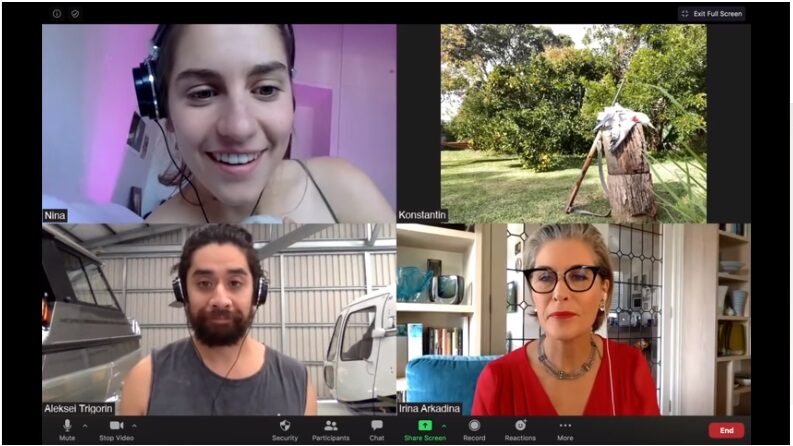
In the Auckland Theatre Company’s new online version of Chekhov’s The Seagull, Arkadina (Jennifer Ward-Lealand) interrupts a soulful interlude of mutual admiration between Trigorin (Shadon Meredith) and Nina (Nathalie Morris) while Konstantin’s dead seagull languishes on a stump. Photo credit: Owen McCarthy.
Act Two is launched by Arkadina’s invitation to a Book Club Zoom. Trigorin hosts a ‘Farewell Zoom’, in anticipation of their return to NYC (against the advice of Dorn) to bring us Act Three. Although we may assume the pandemic will have passed by 2022, when Act Four takes place, Arkadina – in New York at last with Trigorin – has heard her bother is unwell so she virtually revives a family tradition that used to happen at The Lake by inviting everyone in New Zealand to Zoom together for ‘Sorin’s Bingo Night’. And because NZ was at Level 2 when it was recorded, Konstantin has gone to Dr Dorn’s place to work and Masha has followed to be his assistant. As for Nina’s final meeting with Konstantin, having returned from an abortive attempt to succeed in L.A., she Facetimes him.
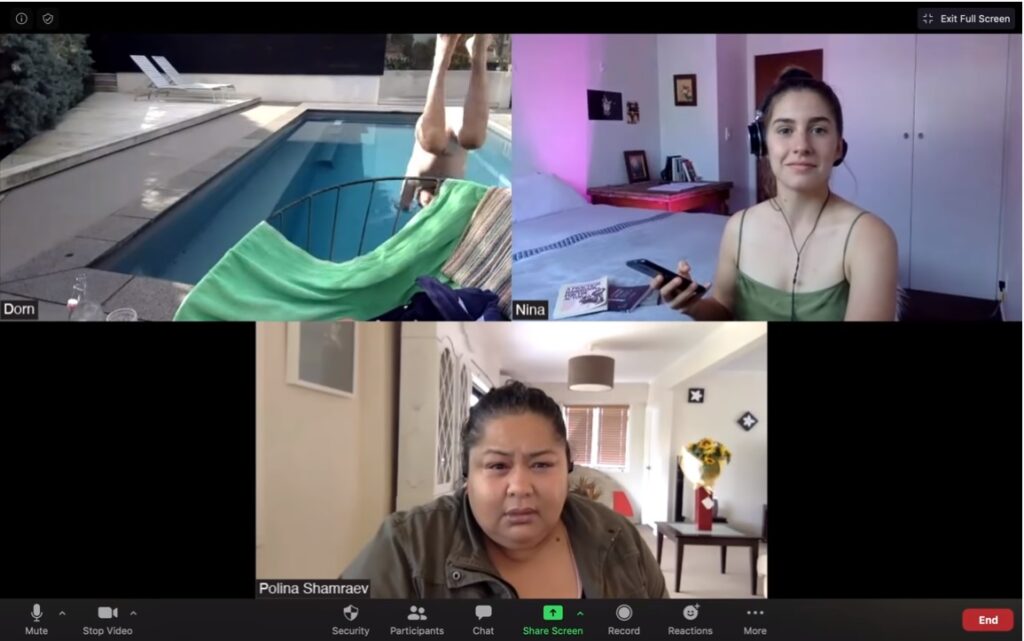
Dr Dorn (Stephen Lovatt) takes a dives in his lap-pool, amusing Nina (Nathalie Morris) while love-lorn Polina (Goretti Chadwick) suffers in silence. Photo credit: Owen McCarthy.
With each episode the actors, and their online director and design consultant, become more adept at using their device cameras in artistically appropriate ways. My final review concludes:
Director Eleanor Bishop, with co-writer Eli Kent and their team of creative artists and actors, have collaborated to make a great virtue of all the restrictions imposed by the Covid-19 pandemic. This online version of Chekhov’s The Seagull is a living testament to the resourcefulness and resilience of creative artists.
View all episodes here – free until 3 July 2020.
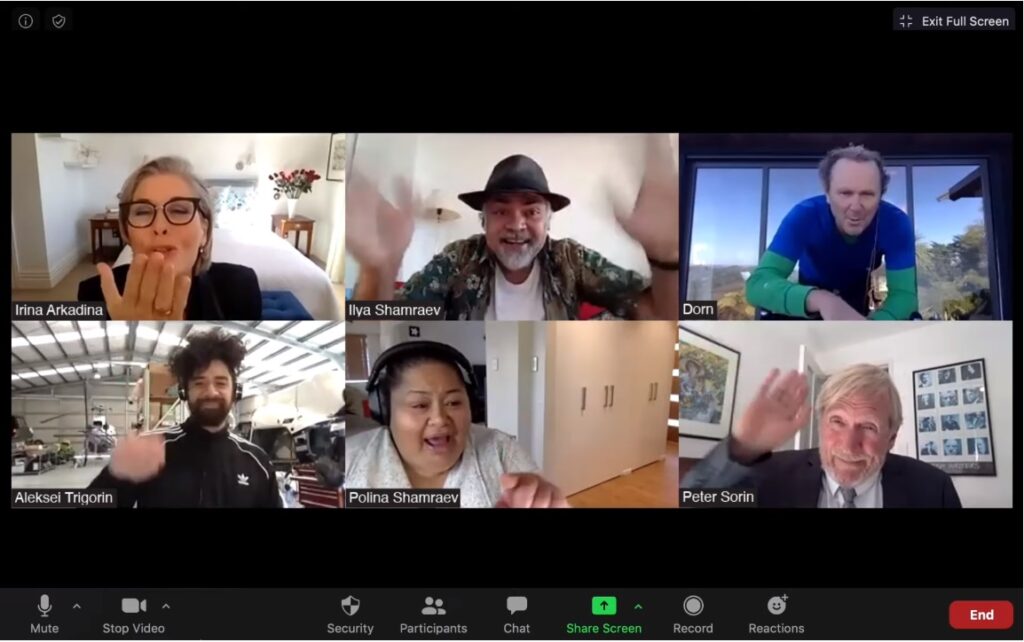
“We can all meet again when this whole thing’s blown over.” Arkadina (Jennifer Ward-Lealand) and Trigorin (Shadon Meredith) farewell Shamraev (Mustaq Missouri), Polina (Goretti Chadwick), Dr Dorn (Stephen Lovatt) and Sorin (Bruce Phillips) – all dressed up with nowhere to go. Photo credit: Owen McCarthy.
Incidentally, since mid-March (before the ATC announced The Seagull) the newly formed theatre company Bubble Bound Productions (involving 3rd year theatre students from Victoria University of Wellington), co-directed by the aforementioned David O’Donnell, have been developing a digital adaptation of Chekhov’s Three Sisters due to go online at on Friday 12 June at 5pm (NZ time).
One more Lockdown theatre production must be included: It’s Behind You! produced by Wellington’s Circa Theatre, Zoomed actors in from Wellington, Palmerston North and Auckland. These excerpts from my review sum it up:
In the time of serious Lockdown, Andrew (Patterson) hosts a Zoom drinks-and-catch-up with his friends Chris (Parker) and Carrie (Green), while putting up with the attentions of his very recent and ever-loving partner Simon (Leary). While they use their real names, and those of others in their bubbles – e.g. Brynley Stent is Chris’s flatmate – they are in role as character constructs who may contain traces of themselves but are otherwise fictitious. And wonderfully rendered they are, too …
Guilty secrets emerge in the foreground as spooky things happen in the background – hence the title …
The way it resolves, dramatically, seems to flip the popular notion that dealing with Covid-19 has made us a more caring community. It even raises the possibility that state control has gone too far. Or is it that a guilty conscience can rob us of our empathy and turn us into everyday sociopathic monsters? For those who want genres like Comedy Horror to go deeper that spooky thrills, then, It’s Behind You! delivers something to chew on.
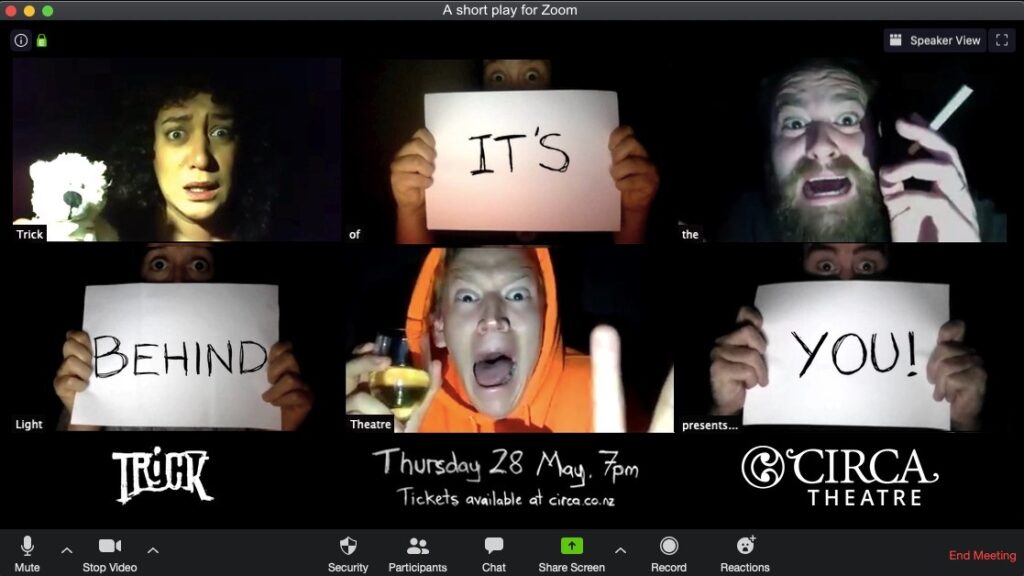
Promo screen shot – clockwise from top left: Carrie Green, Andrew Patterson and Chris Parker with Simon Leary behind the cards. Photo credit: Trick of the Light.
Now, much earlier than most modelling had predicted, New Zealanders are navigating back to relatively normal life, albeit within a nationwide bubble with strict controls at the inbound border. Shattered performing arts schedules are being reassembled with inevitable alterations and we look forward to being able to gather once more in public venues to share the vital, vibrant and irreplaceable experience of live performance.
This post was written by the author in their personal capacity.The opinions expressed in this article are the author’s own and do not reflect the view of The Theatre Times, their staff or collaborators.
This post was written by John Smythe.
The views expressed here belong to the author and do not necessarily reflect our views and opinions.

